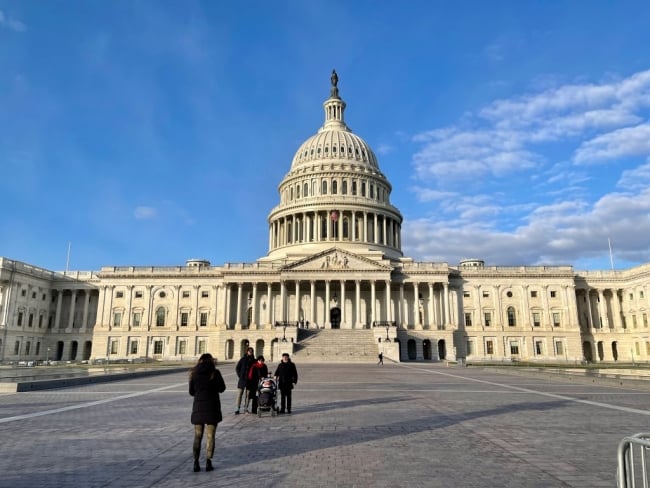You have /5 articles left.
Sign up for a free account or log in.

Congress's coronavirus package gives less aid to wealthy universities.
Daniel Slim
After President Trump and Education Secretary Betsy DeVos criticized giving private colleges and universities with large endowments help in the CARES Act, wealthier institutions like Harvard, Yale and Stanford Universities had their share of the money in the latest coronavirus relief package cut in half.
Under a little-noticed provision in the bill passed two weeks ago, private higher education institutions that were required by a 2017 law to pay a 1.4 percent excise tax on net investment income not only had their aid slashed, they were barred from using the money they will get to defray their financial losses from the pandemic. The relief bill allows them only to use the aid on emergency grants to students or to pay for personal protective equipment and other health and safety costs associated with the coronavirus. Higher education received about $23 billion in the legislation.
The provision affects about 30 private colleges and universities who have to pay the tax because they have at least 500 tuition-paying students and assets of at least $500,000 per student, said Steven Bloom, the American Council on Education’s government relations director. However, that number is constantly changing, particularly during the economic fallout of the pandemic, as the value of the endowments fluctuates over and under the threshold.
Spokespeople for the Education Department and Senator Josh Hawley, a Missouri Republican, who has pushed to keep well-endowed institutions from receiving COVID-19 relief, didn’t return inquiries. But one higher education lobbyist said the provision was apparently pushed by the White House during the negotiations over the package.
The provision is apparently a nod to DeVos, Trump and some Senate Republicans, who had criticized giving colleges with large endowments they could dip into part of the $14 billion in aid the CARES Act allocated to colleges and universities.
Trump, for instance, criticized the idea of giving Harvard, which had an endowment of $39.4 billion in 2019, any help. “They have one of the largest endowments anywhere in the country, maybe in the world, I guess, and they’re going to pay back that money,” Trump said.
"Wealthy institutions that do not primarily serve low-income students do not need or deserve additional taxpayer funds," DeVos followed up. She also urged Congress to change its rules for distributing the stimulus funds. "This is common sense. Schools with large endowments should not apply for funds so more can be given to students who need support the most," she said.
In May, four Senate Republicans, led by Hawley, co-sponsored a bill that would prohibit universities with endowments larger than $10 billion from receiving CARES Act funds unless they spend 10 times the amount of federal funds appropriated to them on coronavirus-related financial assistance for students.
In response to the criticism, some institutions like Harvard, Princeton and Stanford Universities decided to forgo accepting their share of CARES funds.
“It seems like mostly a political statement to avoid the Twitter debates of last spring,” said Jackson Nell, senior analyst at education research company, EAB, who mentioned the provision in a blog post. “Harvard is probably happy to be out of the picture.”
Spokespeople for Harvard and Princeton had no immediate reaction.
Exactly how much the provision will cost the universities couldn’t be determined Tuesday. The Education Department, as well as the American Council on Education, were still figuring out how much institutions will get under a formula Congress created in the bill to divide up the money.
But Bloom and Jon Fansmith, ACE’s government relations director, criticized cutting help from even well-heeled colleges. Some institutions, like Georgetown University, chose to give all their CARES Act funds to students in need. Fansmith said slicing the amount they will get could come out of students’ pockets.
“It’s taking money away from students with real needs,” Fansmith said. “It’s punishing the wrong people.”
Bloom also argued that despite the image of colleges rolling in dough, the provisions reflect a misunderstanding of endowments, noting they are often created by donors for a specific purpose and cannot be used to defray the costs of the pandemic or assisting students.
“A number are major research institutions,” Bloom also said. “These are dollars that would be going toward addressing the crisis we’re in the middle of right now. They’re hospitals and medical schools. You’re taking money away from the front lines of this huge medical crisis.”
Pedro Ribeiro, spokesman for the Association of American Universities, which represents 65 research institutions, echoed the argument. "As America’s leading research universities stand on the front line of the battle against COVID-19, working to treat the sick and vaccinate our nation, stripping them of resources during these difficult times is foolhardy and dangerous," he said.
In addition, Nell and other higher education experts said community colleges will receive a greater share of the relief funds than they did under the CARES Act because Congress is distributing the funds differently.
Community colleges strongly complained about being shortchanged in the CARES Act, because the funding was divvied up based on the number of full-time-equivalent students at institutions, which disadvantages community colleges, where many students only attend part-time. Four-year colleges, in what’s been a heated debate, argued they should receive more of the funds because they were more likely to have lost funds from closing residence halls during the pandemic.
The latest relief package, on the other hand, strikes a compromise, dividing up relief funds based on both the number of full-time and the total number of students institutions have.
“Community colleges face extreme challenges as the pandemic continues to impact both enrollments and state funding,” said David Baime, the American Association of Community Colleges’ senior vice president for government relations and policy analysis. “But the new funding will be of immense help in this difficult time.”




